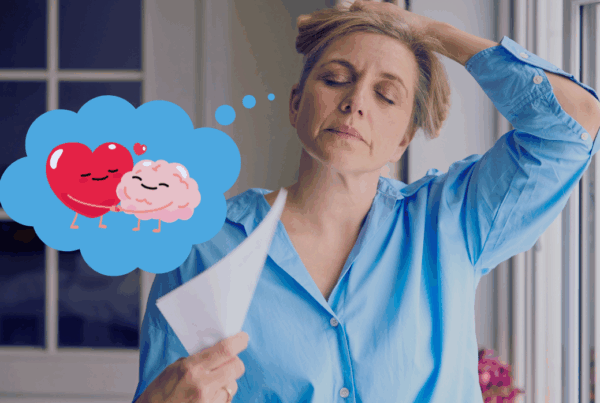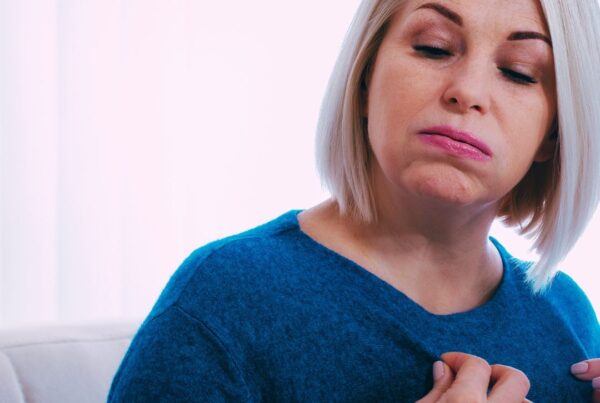Sometimes for health or personal reasons, HRT is not an option. There are alternatives you can try, which can be beneficial even if you also use HRT.
Hot flushes are synonymous with our common understanding of menopause. They will affect 80% of women and 20% of women will have them severely. On average they’ll last over seven years but some women continue to flush right throughout the rest of their life. Females who start their flushes early in perimenopause are unfortunately likely to have them for a long time.
The cause of hot flushes is not entirely known but almost certainly relates to the touchy thermostat deep in the brain which gets triggered indirectly by low oestrogen levels. Research into which of the brain’s neurotransmitters is involved holds promise for non-hormonal treatment of hot flushes in the future.
Oestrogen replacement is by far the most effective method to treat bothersome hot flushes but some women cannot take HRT and others choose not to. So-called ‘natural’ oestrogens from compounding are of course hormonal therapies as well but lack the regulation and therefore safety of hormones obtained by prescription so we will not include them here.
Here are some non-hormonal options that might help manage your hot flushes.
Avoid triggers
Many females find hot and spicy foods and drinks, hot environments and being over clothed all trigger hot flushes. Avoid the triggers if you know them. Alcohol is a known culprit!
Layer up, layer down
Simple environmental measures such as wearing layers of clothes that you can easily remove, positioning yourself where there might be fresh breeze or cool air conditioning, having cold water available to you and bedclothes that you can easily throw on and off are strategies most women have come to know well.
Lifestyle
Getting all the foundational pieces of a healthy lifestyle in place can reduce both the burden and bother of hot flushes. These include regular physical activity, healthy food choices (especially those that reduce insulin resistance), sound sleep routine, techniques to manage your stress, reducing alcohol intake and giving up smoking. Yoga, mindfulness, hypnosis and cognitive behavioural therapy (CBT) can reduce the impact of your flushes. Visualisation and breathing techniques might also help.
Supplements
Magnesium combined with taurine is probably the most useful supplement for hot flushes. Taken at night it can also help sleep and some of the other symptoms of the menopause. A dose of 300mg (as glycinate) combined with 3g of taurine is the optimal preparation.
Herbal remedies
Black cohosh is the most widely used herbal remedy for hot flushes and there is a small amount of scientific evidence for a mild benefit. It can interact with other medicines and there is the question of whether it can cause liver damage. It is probably worth checking your liver function from time to time if you take black cohosh.
Red clover, evening primrose oil, valerian root and dong quai are sold as solutions for menopausal hot flushes however there is very little evidence for a beneficial effect over placebo (fake treatments).
Phytoeostrogens
These are compounds found in food and herbs that are oestrogen-like in their chemical structure. Some have a similar effect to oestrogen whilst others will block oestrogen receptors and limit your own body’s oestrogen effect. We are uncertain as to the role of phytoestrogens and their impact on menopausal symptoms. There are many to be found in a Mediterranean diet which is helpful for many health conditions.
Non-hormonal prescription medication
Antidepressants of the SNRI and SSRI classes can reduce the impact and frequency of hot flushes. This has the added benefit of helping mood disorders if you suffer from them. Gabapentin (used for epilepsy and chronic pain) and clonidine (an antihypertensive) have a mild effect at reducing hot flashes. Mirtazapine is an ‘atypical’ antidepressant that can reduce hot flushes and at low doses also helps sleep.
Unfortunately, no non-hormonal medication works as well as HRT.
If you are bothered by hot flushes and don’t want to or can’t use HRT, starting with magnesium and taurine is a good first step. At the same time, cut back on your alcohol, pay attention to your sleep routine and get a regular amount of physical activity. If you need more help and HRT remains off the table, then an antidepressant is the next choice. You will need to see a doctor if you require prescription medication.






